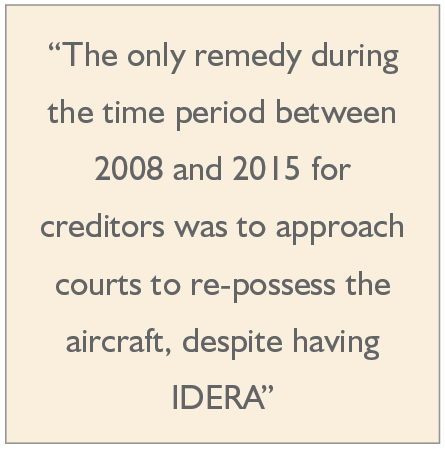
By Vikram Bhargava and Lovejeet Singh, Clasis Law
E : vikram.bhargava@clasislaw.com
E : lovejeet.singh@clasislaw.com
The Indian aviation industry has seen rapid growth in recent years. The key factors for this growth have been constant liberalisation of foreign direct investment policy, expansion of regional aircraft routes leading to a surge in domestic passenger traffic, increasing chartering business and demand of private aircrafts. India is currently considered the third largest domestic civil aviation market in the world.
Financing of aircrafts is key for the growth of aviation industry. While financing aircrafts, lessors or financiers (being creditors) always look for a comfort to re-possess the aircraft immediately in case of default by the operator of the aircraft. The Cape Town Convention on International Interests in Mobile Equipment and its Protocol (CTC) secures the interest of creditors and provides them rights to re-possess aircraft by using Irrevocable De-registration and Export Request Authorisation (IDERA) in case of default by the operator of the aircraft.
Cape Town Convention
The CTC provides that if IDERA has been issued in favour of the creditor by operator of the aircraft, then the creditor can procure de-registration of aircraft and export the same without consent of the operator although prior written consent of the holder of any registered interest ranking in priority to the creditor would be required. The registry authority and other administrative authority should expeditiously cooperate and assist the creditor. The rights in favour of creditor established by IDERA cannot be revoked by the operator without the consent of creditor.
India’s position under CTC
India ratified the CTC in 2008 with specific declarations that (i) it will apply provision srelating to usage of IDERA by creditors and (ii) the remedies available to creditors which are not expressed to require application to the court under CTC may be exercised without court action and without leave of the court. In spite of ratification of CTC since 2008, India took a considerably long time to make changes in local law to adopt relevant provisions of CTC relating to IDERA and re-possession and export of the aircraft (as international treaties entered into by India do not automatically become the rule of law). It was only in 2015 and subsequently in 2017, that India made changes in the Aircraft Rules, 1937 (Rules) granting rights to creditors as per CTC.
 Judicial precedents
Judicial precedents
The only remedy during the time period between 2008 and 2015 for creditors was to approach courts to re-possess the aircraft, despite having IDERA as the Directorate General of Civil Aviation (DGCA) would usually refuse to de-register the aircraft without consent of the operator. Popular cases of Kingfisher Airlines and Spice Jet are examples of such instances.
Although Kingfisher Airlines’ case was not based on CTC but creditors had to approach court for getting re-possession of the aircrafts as DGCA refused to de-register the aircrafts. In Spice Jet’s case, the court ordered de-registration of the aircraft by DGCA on the basis of IDERA and further observed that unless a remedy available to the creditor under CTC requires application to the court, the same can be exercised “without court action and without the leave of the court”.
Present Indian legal landscape 1
The registration of an aircraft should be cancelled by DGCA within five working days, if an application is received from IDERA holder prior to expiry of the lease along with a certificate that all registered interests ranking in priority have been discharged or holders of such interest have consented to the deregistration and export. However, deregistration of the aircraft should not affect rights of any government authority to arrest, detain, attach or sell an aircraft object for payment of amounts owed relating to the services provided in respect of that object.
Consequent upon cancellation of the registration of aircraft, if an application is made by IDERA holder for export of the aircraft, DGCA should take action within five working days to facilitate export and physical transfer of the aircraft.
Conclusion
The above judgments and amendments in the Rules have settled the position of law to an extent in relation to enforcement of IDERA. However, India has been slow in incorporating provisions of CTC in domestic law. India should expeditiously implement all the provisions of CTC in order to make Indian aviation industry more attractive for foreign financiers.
End Notes:
1. The Government of India has proposed few changes in the Rules relating de-registration and export of aircraft by IDERA holder. The proposed changes are in the draft stage and comments of stakeholders have been sought.
E: vikram.bhargava@clasislaw.com
E: lovejeet.singh@clasislaw.com
T: (91) 11 4213 0000
F: (91) 11 4213 0099

















